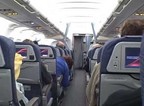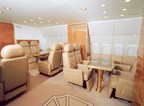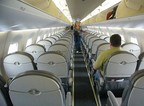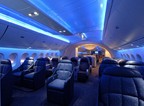Let’s start with the bad news: Long flights can be a nightmare! Whether you are a smoker or not, whether you are traveling first class or you are crammed at the back of the aircraft, whether you manage to sleep or stay awake listening to the snoring right next to you. The oxygen in the cabin reaches the limits of adequacy, the seven-hour long immobility is not the best friend of the human body and the usually not so good tasting awful food cannot overcome the feeling that you are in an environment hostile to the development of any form of life.
However, there is good news. The most important of which is that one hundred years ago the average European had so many chances to jump on shopping in New York and return to work at Monday as many as we have today to go for a holiday trip to Mars. Growling and snorting about a seven-hour trip is a privilege compared to the growling and snorting for a thirty-day long trip. Especially as there are ways to “sugar the pill” and to spend as much pleasantly as possible the endless hours on the plane and get off it with your body entirely cramped, but without any psychological problems.
- Before the flight
In order to survive long flights, do not fall into the classic trap of staying awake during the night in order to sleep easily on the plane. Even if your goal is achieved, the sleeping conditions and the lack of oxygen will not replace in any case those eight hours of sleep in your bed. All you will accomplish is to get to your destination even more overwhelmed than you would normally feel after a long flight.
After finishing packing, prepare a small backpack with the essentials for the plane. Include certainly one or two good books, some crosswords or Sudoku, one mp3 player, two chocolates, a deodorant, natural tears for your eyes, gums-especially if you smoke-, a small-package of less than 100 ml-water spray or moisturizer for the face.
If you wear contact lenses, ask your optician or pharmacy for a liquid-travel package also less than 100 ml and put it in the bag that you get on the plane. Take off your lenses after take-off, or at least before sleeping.
Wear your most comfortable shoes you have. Preferably sports, with cords that can loosen. Consider how your feet will swell during the flight because of the lack of oxygen combined with immobility, so if you have put on your narrow shoes you might not be able to take them off.
Avoid another classic trap, staying hungry in order to eat on the plane. Chances for a decent meal are not on your side, and even in that rare case the amount of will not be enough to sate-especially if you have not eaten anything before.
If the airline allows you to choose your seat on the plane, consider your choice carefully. The general rule of thumb states that seats next to the emergency exit have more space in front of them, but the seats do not “lie back” at all. This applies as well to the last row of the airplane which, however, do not have that extra space either.
Take some time to learn about and take advantage of the miles offers, which can in some cases to ensure you free ticket upgrades to business or even first class seats.
Speaking of business and first class, there is often confusion made between the business and first class. This is responsible for a lot of money wasted in vain for not a particularly comfortable travel. The super-deluxe seats that “lie” 180 degrees and can be converted into a bed, with purple dividers between them and glasses of champagne in their table that you see on fly sheets, those are in the first class-not in the business class. The only difference between the business class and the economy class is the extra space in front of the seat, headphones that isolate the noise, and a few more films and perhaps some video games-in screen.
- During the flight
In order to survive long flights, organize the space around your seat correctly, once aboard: the backpack and jacket in the cupboard above the seat, the essentials-a book, a crossword puzzle or magazine and mp3 player -in front of it. Do not squeeze things under your seat because you will be stepping on them constantly and ou will not be able to settle. If you find on your seat some packaging usually offered by companies containing a blanket, pillow, socks and toothbrush, put it in the cupboard until you need to open it.
Check that the headphones and the screen to in front of your seat are operational, otherwise ask the flight attendant if you can change position after all passengers are
boarded.
Stay hydrated. The lack of oxygen in the air dehydrates the body and skin. Drink plenty of water, at least one glass every half-hour and go to the bathroom every one hour to wash your face with water.
Try to move often in order to take the numbness out, and to avoid blood clots. Get up and walk at the runway and often change your position on the seat.
Take off your watch and leave it in the bag. The time passes excruciatingly slow if you look constantly at your watch. Moreover, you will not manage to relax if you keep counting down until landing.
Take off your shoes-only if you are sure that the laces are loose enough so that you can put them back on and wear the socks that you will find in the package on your seat, along with a blanket and pillow. You could also loosen somewhat your belt, suspenders or anything else pressuring you.




